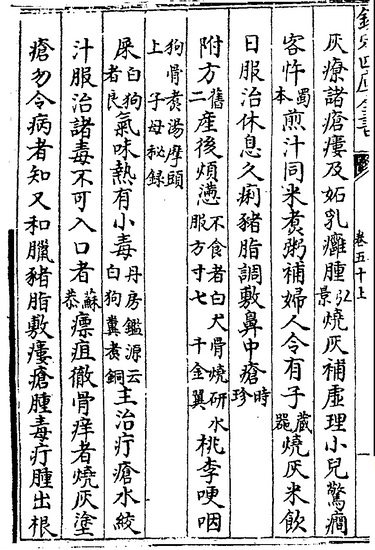From ginseng to dog poo
- Rachelle
- Mar 4, 2024
- 3 min read
一人性最慳吝,忽感癆瘵之疾,醫生診視云:“脈氣虛弱,宜用人參培補。”病者驚視曰:“力量綿薄,惟有委命聽天可也。”
A man of a miserly character was suddenly stricken with consumption. The physician said after examination, “Your pulse has an air of weakness. It is advisable to strengthen [yourself] with ginseng.” Gazing at him in astonishment, the sick man said, “A man of meagre means [like myself] can but leave [my] life at the mercy of heaven!”
醫士曰:“參既不用,須以熟地代之,其價頗賤。”病者搖首曰:“費亦太過,願死而已。”
The physician said, “If ginseng is out of the question, processed Rehmannia root [1] makes a fair substitute at an affordable price.” “Which is prohibitive enough”, said the sick man, shaking his head, “Death is [my] only wish.”
醫知其吝嗇,乃詐言曰:“別有一方,用乾狗屎調黑糖一二文服之,亦可以補元神。”病者躍然起問曰:“不知狗屎一味,可以禿用否?”
Realising his parsimony, the physician tricked [him], saying, “Here is an alternative prescription. Take some dry dog’s faeces mixed with a little brown sugar. That can also be a supplement to [your] vital energy.” The sick man sprang up, asking, “Will it suffice to take dog’s faeces alone, if I may ask?” [2]
* From Youxi zhuren 遊戲主人 (fl. 19th century) ed., Xiaolin guangji 笑林廣記 9.4b:
[1] Rehmanniae Radix Praeparata, a common ingredient in traditional Chinese medicine; for more comprehensive overviews, see the entry "shu di huang 熟地黃" in Dan Bensky, Steven Clavey, Erich Stöger, and Andrew Gamble (eds.). Chinese Herbal Medicine: Materia Medica. 3rd ed. (Seattle WA: Eastland Press, 2004), 742-44; and the entry "dihuang 地黃" in Erich A. Stöger, Arzneibuch der chinesischen Medizin: Monographien des Arzneibuches der Volksrepublik China 1985 und 1990 (Stuttgart: Deutscher Apotheker Verlag, 1995-).
[2] For the record, faecal matter, fresh and dry, of humans and animals young and adult, are considered to hold various medicinal properties in the traditional Chinese medical system. The physician's joke is therefore not as apparent as it may seem, and the sick man has good reasons to take it seriously. Note that the Chinese were not alone in this. The Greek philosopher Celsus (fl. 175–177), for example, also recorded with diligence various medicinal effects of animal dung on the human body and would have appreciated the multiplicity of Chinese excremental remedies; see Celsus, De Medicina, with an English translation by W. G. Spencer, Vol. 2. (The Loeb Classical Library. Cambridge, Mass., London: Harvard University Press; Heinemann, 1935), Books V-VI; or more conveniently at the Perseus Digital Library: https://www.perseus.tufts.edu/hopper/text?doc=Perseus%3Atext%3A1999.02.0142%3Abook%3D5%3Achapter%3D5.
Pages on the medicinal properties and uses of dog poo in the Bencao gangmu 本草綱目 (Compendium of Materia Medica, 1596); https://ctext.org/library.pl?if=en&file=53291&page=74
Copyright Declaration*:
The texts and images used on the website of Rachelle's Lab are either from the public domain (e.g. Wikipedia), databases with open data licenses (e.g. Shuhua diancang ziliao jiansuo xitong 書畫典藏資料檢索系統, National Palace Museum, Taipei), online libraries that permit reasonable use (e.g. ctext.org), or original work created for this website.
Although fair use of the website for private non-profit purposes is permitted, please note that the website of Rachelle's Lab and its content (including but not limited to translations, blog posts, images, videos, etc.) are protected under international copyright law. If you want to republish, distribute, or make derivative work based on the website content, please contact me, the copyright owner, to get written permission first and make sure to link to the corresponding page when you use it.
版權聲明:
本站所使用的圖片,皆出自公有領域(如維基)、開放數據庫(如臺北故宮博物院書畫典藏資料檢索系統)、允許合理引用的在線圖書館(如中國哲學電子化計劃)及本人創作。本站允許對網站內容進行個人的、非營利性質的合理使用。但請注意,本站及其內容(包括但不限於翻譯、博文、圖像、視頻等)受國際版權法保護。如需基於博客內容進行出版、傳播、製作衍生作品等,請務必先徵求作者(本人)書面許可,并在使用時附上本站鏈接,註明出處。
*Read more about copyright and permission here.





Comments